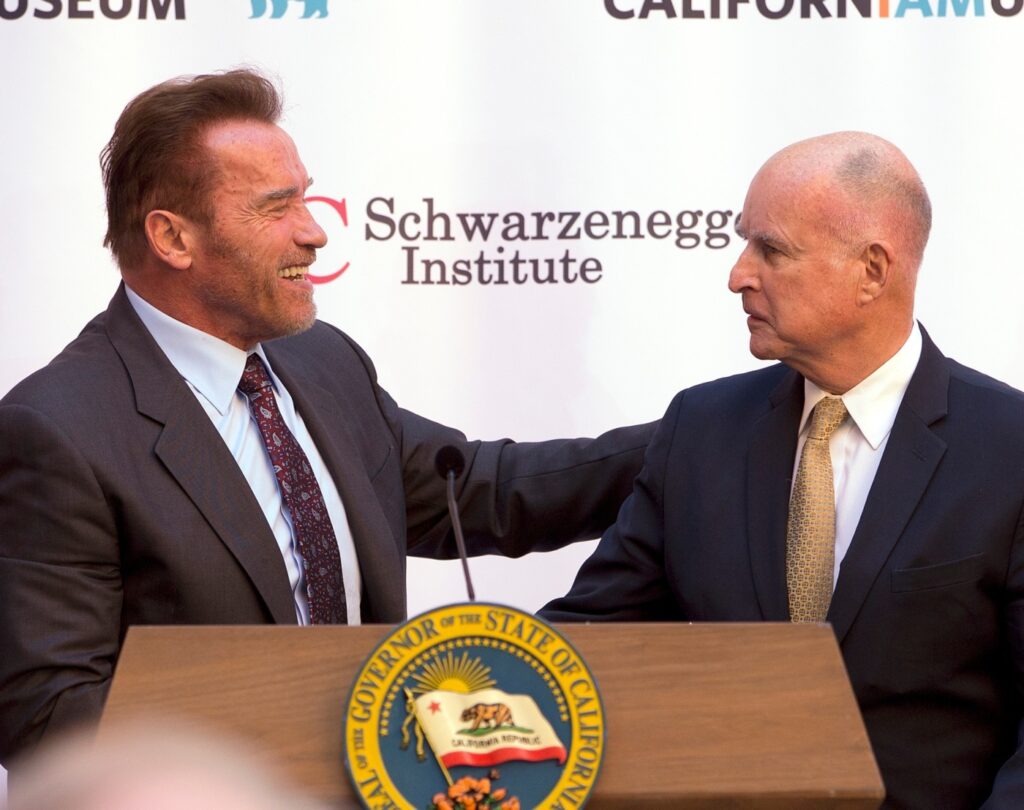
I must be getting old. Jerry Brown is starting to make sense to me. Arnold Schwarzenegger sounds like an international statesman.
And heeding the advice of California’s governors now seems like the best path for humanity.
It’s improbable that two ex-governors—one known for head-scratching aphorisms, the other for silly one-liners—are now global voices of reason. It’s also logical, in a perverse way. As the world goes mad and sets itself on fire, where better to turn for wisdom than crazy, combustible California?
Brown’s and Schwarzenegger’s ascents to sage status reflect the extent to which California, the world’s fifth largest economy, functions as its own country, with its governor serving as a second American president. California governors constitute a fourth branch of the U.S. government—employing regulations and state law to check the president, Congress, and the courts.
When California governors leave office, they maintain high profiles but carry less political baggage than presidents, whose foibles our polarized media cover obsessively. They’re using notoriety in a very California way, mixing nostalgic references to their own personal histories with dreams of a more peaceful future. Rejecting the knee-jerk good-and-evil moralism of American politics, the for making common cause with rivals and enemies—the sort of hard-headed inclusion that represents the California idea at its best.
Schwarzenegger’s most recent statement was a short video urging President Putin to stop the war in Ukraine. But the former governor also rejected the increasingly commonplace American condemnation of all things Russian. Instead, speaking in English with Russian subtitles, he drew from his own history of making friends and movies in Russia to express his affection for the country and its people.
The video’s most powerful, heartbreaking moment came when Schwarzenegger spoke directly to Russian soldiers about his father, an Austrian policeman who fought with the Nazis during World War II.
“The Russian government has lied not only to its citizens but to its soldiers,” he said. “When my father arrived in Leningrad, he was all pumped up on the lies of his government. When he left Leningrad, he was broken—physically and mentally. He lived the rest of his life in pain—pain from a broken back, pain from the shrapnel that always reminded him of those terrible years and pain from the guilt that he felt.
“To the Russian soldiers listening to this broadcast… I don’t want you to be broken like my father.”
As Schwarzenegger tugged at hearts, Brown hammered on heads.
In a remarkable essay published this month in The New York Review of Books, Brown challenged calls in the U.S, for greater confrontation with China.
He started by framing the last 20 years as a period of American-triggered war and suffering, killing more than 900,000 people, displacing tens of millions, and cost the U.S. $8 trillion.
“One might assume that such disastrous results, and the ignominious end of the war in Afghanistan last year, would lead to a period of reflection and soul-searching,” Brown wrote. “Yet no such inquiry has occurred—at least not one that fully grapples with the shocking self-deception, pervasive misreading of events, and powerful groupthink that drove the longest war in American history.”
Brown pointed to books by “think tank specialists and defense department insiders,” like The Strategy of Denial by Elbridge Colby, for promoting even more conflict that increases the chances of a catastrophic China-U.S. war. These include more military competition and “selective nuclear proliferation” (in Colby’s formulation) to friendly countries.
The ex-governor, who leads the California-China Climate Institute, a Berkeley-affiliated think tank, is clear-eyed about the Chinese government’s many sins. But Brown argues powerfully that confrontation will only make things worse.
“Framing the China threat as irredeemably antagonistic, as many ‘political realists’ are currently doing, misses the reality that both countries—to prosper and even to survive—must cooperate as well as compete,” he wrote.
Related Articles
Biden Administration’s wrongheaded approach to freight trains
President Biden must draw a ‘red line’ in Russia-Ukraine conflict: Douglas Schoen
Messing with Texas won’t fix California
What happened to John Eastman?
Ketanji Brown Jackson: Letters
Brown argued instead for vigorous engagement with China that focuses on avoiding catastrophes. He calls this strategy “planetary realism… an informed realism that faces up to the unprecedented global dangers caused by carbon emissions, nuclear weapons, viruses, and new disruptive technologies, all of which cannot be addressed by one country alone.”
That powerful argument should carry extra weight coming from someone who spent four terms governing California, a state famous for catastrophes.
The world needs Brown and Schwarzenegger to keep counseling all of us. It’s a role that ex-presidents used to fill. But that was before Bill Clinton got sidelined by his foundation’s lack of transparency, before George W. Bush became a painter, before Barack Obama went on a weird narcissistic bender with Bruce Springsteen, and before Donald Trump attempted a coup.
So, maybe it’s time for our last two governors to team up. They complement each other, the Philosopher-Nerd and the Muscleman-Movie Star. Their wise interventions might just save the world from itself.
Joe Mathews writes the Connecting California column for Zócalo Public Square.
